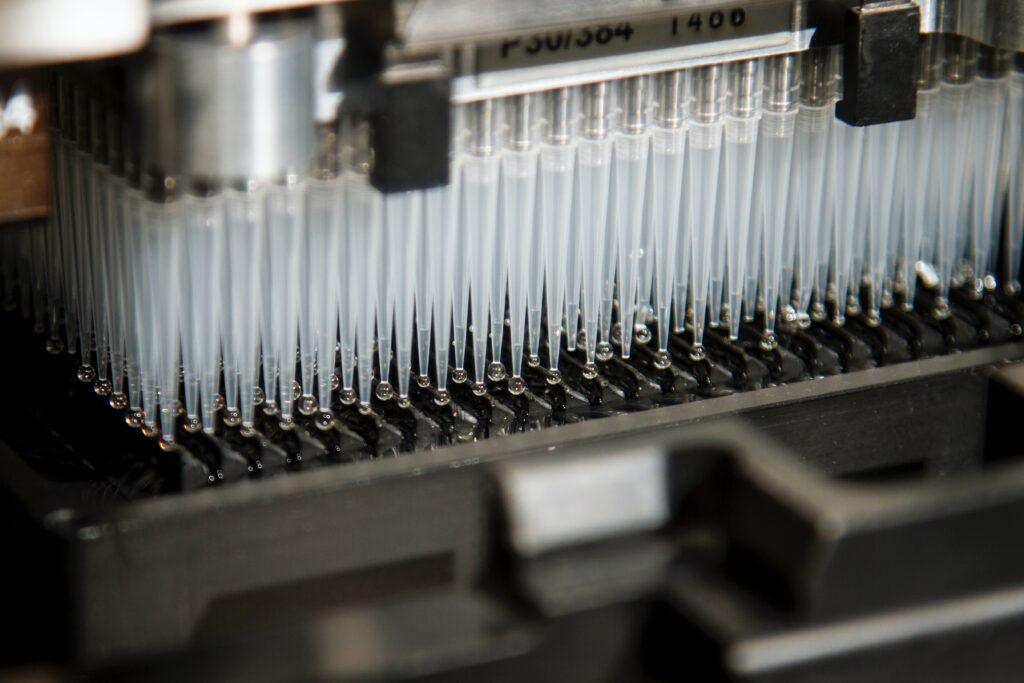
In recent years, we have seen significant developments in the healthcare and medical fields driven by artificial intelligence (AI) technology. AI is not just a science-fiction concept; it has myriads of real-world applications that are revolutionising nearly all sectors. In this article, we will explore how AI influences drug discovery, patient care, and the future of medicine.Web Capitals aims to glimpse the fascinating world of AI in pharmaceuticals, whether you’re a future scientist, a curious teen, or simply interested in the most cutting-edge technological developments.
Before delving into the application of AI in the pharmaceutical sector, let’s first define artificial intelligence (AI). AI is the development of computer systems capable of performing tasks that typically require human intelligence. It involves creating algorithms and software that can think logically, learn from experience, and make decisions. Machines are now equipped with the ability to analyze data, identify trends, and make predictions or recommendations based on those analyses. In simple terms, AI aims to develop intelligent machines that can think and behave like humans, improving our lives and increasing productivity across various industries, including healthcare and medicine.
Accelerating Drug Discovery using Artificial Intelligence

The process of discovering new medicines is time-consuming and resource-intensive. However, AI is accelerating and improving this process. AI algorithms can analyze vast amounts of data, including genetic information, molecular structures, and previous research findings, to identify patterns and relationships. By leveraging machine learning algorithms, these datasets can be utilized to focus the search for promising compounds, saving time and reducing costs associated with conventional trial-and-error methods.
AI also plays a crucial role in virtual screening, where computers examine databases of molecules to predict their potential for therapeutic application. AI algorithms can identify the most potent substances for further research by simulating interactions between drugs and target proteins. This streamlined approach expedites the delivery of potentially life-saving drugs to patients, facilitating the drug development process.
BenevolentAI, a London-headquartered company, is a leading AI-enabled drug discovery and development company that adopts an AI-first approach to develop new drugs. By employing machine learning algorithms such as deep learning and natural language processing (NLP) methods, BenevolentAI extracts information from scientific literature, analyzes complex biological data, and identifies potential correlations and underlying relationships that may be challenging to discover otherwise. This AI-first approach increases the likelihood of success in clinical trials by identifying new targets, optimizing pharmacological characteristics, and selecting the most promising candidates for further development. Furthermore, AI is essential in precision(personalized) medicine.
Prestigious universities like Stanford University and MIT are actively involved in research on AI-enabled drug discovery. Their researchers have explored various aspects of applying artificial intelligence and machine learning techniques to accelerate the drug discovery.
How Artificial Intelligence Makes Precision Medicine Super Precise!

Genetic makeup varies from person to person, and AI assists in analyzing patient data to personalize treatments. AI algorithms can predict disease risks, determine the best treatment plans, and discover potential drug interactions or adverse reactions unique to an individual by analyzing genetic data and medical records. The use of personalized medicine can significantly improve treatment outcomes and patient care.
The application of AI and machine learning in precision medicine revolves around collecting data from diverse patients, including individuals of different ages, genders, and more. This extensive dataset enables researchers to establish correlations and discover patterns to develop personalized medicine. Machine learning is used to predict potential higher patient risks from the data collected.
Protein Structure Prediction Using Artificial Intelligence

DeepMind, a prominent AI research organisation, has recently developed an artificial intelligence system called AlphaFold. AlphaFold accurately predicts the 3D structure of proteins based solely on their amino acid sequence. This AI-powered protein prediction technology provides a faster, cheaper, and more convenient alternative for characterising increasingly complex targets and facilitating future research and development of novel therapeutic medicines.
Now, you might be wondering why protein structure prediction is important. Antibodies are a class of protein produced by the immune system that helps to identify and neutralise foreign substances, such as bacteria or viruses, in the body. Their functions are determined by their three-dimensional structures. Predicting a protein’s structure based on its amino acid sequence is known as protein folding. It is a complex problem that has puzzled scientists for decades.
A Look at DeepMind’s AlphaFold
DeepMind’s AlphaFold leverages deep learning algorithms and vast amounts of protein data to accurately predict protein structures. It combines evolutionary information, such as genetic sequences of related proteins, with deep neural networks to generate structural predictions. AlphaFold’s predictions are highly accurate and comparable to experimental methods like X-ray crystallography and cryo-electron microscopy.
The breakthrough by DeepMind was widely celebrated in the scientific community as it has the potential to accelerate research and understanding in various areas, including drug discovery, disease mechanisms, and bioengineering. It provides scientists with valuable insights into protein structures, enabling them to understand their functions better and potentially design new therapeutic interventions.
Applications of Artificial Intelligence in Other Areas of Healthcare

AI is not limited to drug discovery; it also advances patient care in various ways. AI algorithms can analyze medical imaging data, such as X-rays and MRIs, to assist radiologists in detecting and diagnosing diseases with greater precision and speed. AI-powered diagnostic systems can examine symptoms, medical history, and test results to diagnose quickly and accurately. This saves time during the diagnosis stage, enabling earlier treatment initiation, particularly in emergencies. You can read The Impact of Artificial Intelligence on Healthcare to learn more about AI and robotics in healthcare.
Additionally, virtual assistants enabled by AI are being developed to answer patient questions, schedule appointments, and provide basic healthcare advice. These virtual healthcare companions can offer support and guidance, particularly in remote locations where access to medical professionals may be limited.
Investment in TechBio Business
AI-enabled drug discovery startups are considered as TechBio business as it is at the intersection of technology and biology, where AI is applied to solve problems in the field of biology, such as healthcare, agriculture, and environmental sustainability. These startups leverage advanced technologies like artificial intelligence, machine learning, and genetic engineering to develop groundbreaking products and services.
Venture capital firms increasingly recognise the potential of TechBio startups and are investing in them. These firms provide funding and support to early-stage and growing companies leveraging technology to drive innovation in biology. One of the notable venture capital firms investing in the TechBio space is Andreessen Horowitz. It is a prominent venture capital firm in California and has recently invested in TechBio startups.
By investing in TechBio startups, Andreessen Horowitz recognises the potential of merging technology and biology to drive significant advancements and disrupt traditional industries. The firm’s investments demonstrate their confidence in the startup’s vision, team, and growth potential.
This partnership between venture capital firm and TechBio startups is expected to provide startups with the necessary financial resources, industry expertise, and network to accelerate their research and development efforts. Additionally, investments validate the startups’ business model and a signal to other potential investors about their potential for success.
Andreessen Horowitz’s involvement in the TechBio space highlights the growing importance of this interdisciplinary field and its potential for transformative impact. It also showcases the venture capital firm’s commitment to supporting cutting-edge technologies and driving innovation in the pharmaceutical sector.
Ethical Considerations in Artificial Intelligence in the Pharmaceutical Industry
While AI has numerous advantages for the pharmaceutical industry, there are also significant ethical considerations. Ensuring patient privacy, data security, and responsible use of AI technologies are important issues that need to be addressed. Transparency in AI algorithms and decision-making processes is essential for maintaining trust and accountability.
AI in drug discovery relies on vast amounts of patient data, including genetic information, medical records, and personal health data. Safeguarding this data and ensuring patient privacy could be a challenge.
Artificial Intelligence’s Contribution in Drug Discovery: A Summary
Artificial intelligence is revolutionizing the pharmaceutical sector, redefining how we approach medical research and healthcare. Integrating AI technologies holds immense promise in advancing drug discovery, diagnosis, treatment, and patient care. By harnessing the power of machine learning, data analytics, and predictive modelling, AI systems can rapidly analyze vast amounts of data, uncover hidden patterns, and make insightful predictions. Moreover, AI enables personalized medicine, tailoring treatments to individual patients based on their unique genetic, molecular, and clinical profiles. Through precision medicine approaches, AI can analyze patient data and provide targeted therapies, minimizing adverse effects and maximizing treatment effectiveness. This individualized approach has the potential to revolutionize disease management, leading to better outcomes and improved patient experiences.
In conclusion, AI is a transformative force in the pharmaceutical industry, offering immense potential to revolutionize drug discovery, personalized medicine, and healthcare delivery. Gen Zers have the opportunity to be at the forefront of this revolution, contributing their unique perspectives and skills to shape the future of medicine. With their passion, curiosity, and dedication, they can help unlock the full potential of AI in healthcare, improving lives and making significant strides towards a healthier, more technologically advanced world.
To stay informed, continuous learning and curiosity are essential. Following trusted sources like Web Capitals can help you stay up to date with emerging technologies, business, healthcare, sports and more.


























Leave a Reply